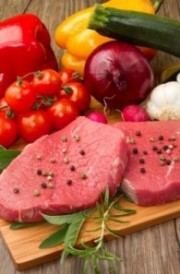 Many of my patients include menopausal women, and men over the age of 60. This is the age of patient who has special nutritional requirements – especially concerning iron. A woman’s need for iron shifts dramatically after she enters menopause – directly opposite what she used to need. Similarly, the iron needs of a man over 60 also shift dramatically to a reverse picture. Both need to avoid iron overload – a condition that can occur from the buildup of iron that may lead to heart disease and other health problems. Here’s what I tell my patients about iron.
Many of my patients include menopausal women, and men over the age of 60. This is the age of patient who has special nutritional requirements – especially concerning iron. A woman’s need for iron shifts dramatically after she enters menopause – directly opposite what she used to need. Similarly, the iron needs of a man over 60 also shift dramatically to a reverse picture. Both need to avoid iron overload – a condition that can occur from the buildup of iron that may lead to heart disease and other health problems. Here’s what I tell my patients about iron.
Iron – How Much Is Enough?
Iron is a most efficient mineral that our body uses for many processes – one of the most important is making red blood cells that transport oxygen throughout all the cells of our body. If iron is deficient, from diet or blood loss, we won’t make enough red blood cells and all the tissues of our body will become oxygen deficient. This is a condition called anemia.
However, too much iron can build up in our bodies resulting in a condition called iron overload and contribute to the development of a number of diseases. In fact, the medical world began to pay closer attention to the correlation of high iron ferritin levels and high heart attack rates that were published in a 1992 Finnish study.
Iron overload creates an aggregate, or extra amount of, red blood cells which creates deposits of a sticky fibrinous material that attaches itself to the inside of internal organs and structures. These deposits can lead to diseases like:
- Liver cirrhosis or cancer
- Diabetes
- Heart attack/heart failure
- Neurodegenerative conditions like Alzheimer, Parkinson, or Huntington’s disease
- Osteoporosis
- Low thyroid (hypothyroidism)
I think you get the picture – many serious health conditions can result from the buildup of too much iron in your body. Here are a few of the warning symptoms of iron overload:
- Chronic fatigue
- Joint pain
- Abdominal pain (from liver involvement)
- Diabetes (from pancreas involvement)
- Elevated iron levels (serum iron, ferritin)
- Irregular heart rhythms
How Do I Prevent Iron Overload?
Not everyone stores too much iron in their body. It depends on what type of iron you eat, heme or non-heme types, and how well it is absorbed. Heme types from red meat, fish, and poultry are better absorbed than non-heme types from vegetable sources. However, to make sure you’re not taking in more iron than we need for our age, the following guidelines will help.
Women: Premenopausal women need about 15-18 mg a day. However, after a woman enters menopause, and is not having regular monthly menstrual bleeding, her need for iron decreases to about half – about 8 mg. If her multiple vitamin contains 18 mg of iron, she is getting twice what she needs from this source alone! Add to that her food sources of iron, especially if she eats fortified foods, such as cereals, iron-rich vegetables, red meat, she could easily be getting 3 times the amount of iron her body actually needs! All this extra iron could be setting her up for higher heart attack and other disease risk noted above. Recommendation: Be sure your multivitamin/mineral supplement does not contain iron. Label should clearly state “no iron”. If in doubt, be sure to read the ingredient label. If you eat vitamin/mineral fortified cereals or breads each day, then cut down on other iron-rich vegetables and limit your intake of red meat to once a week or less.
Men: Men below the age of 80 need about 8 mg of iron as well – same as postmenopausal women. This amount can well be met by eating a healthy diet and watching iron levels of fortified foods. Recommendation: Be sure your multivitamin/mineral supplement does not contain iron. Over age 80, dietary intake may be lower than what it was in younger years and a man may need extra iron at this time. However, this should be confirmed by lab tests (RBCs) first and assessed by a physician who can make the appropriate iron recommendations at that time.
Assessment for Iron Overload: Regular CBC, complete blood counts, done by your physician should be done to assess your iron and serum ferritin levels. If abnormal, your doctor can direct you in the best course. Frequently, donating blood is recommended for treatment of iron overload. In other cases, certain drugs can be taken to reduce the amount of iron in your blood.
Iron is an important mineral vital to our survival. It helps us stay energetic, our muscles strong and active, our bodies well-oxygenated, and our minds clearly thinking. Too much of this good mineral, though, can create havoc and put us at higher risk for disease if our intake of it is not regulated. If you follow the above iron intake recommendations and have regular medical check-ups, this will help ensure that you do not become iron overloaded.
Stay Well,
Mark Rosenberg, M.D.
Wellness Guide to Supplements – Iron, http://www.wellnessletter.com/html/ds/dsIron.php
Iron Overload, http://www.irondisorders.org/iron-overload
